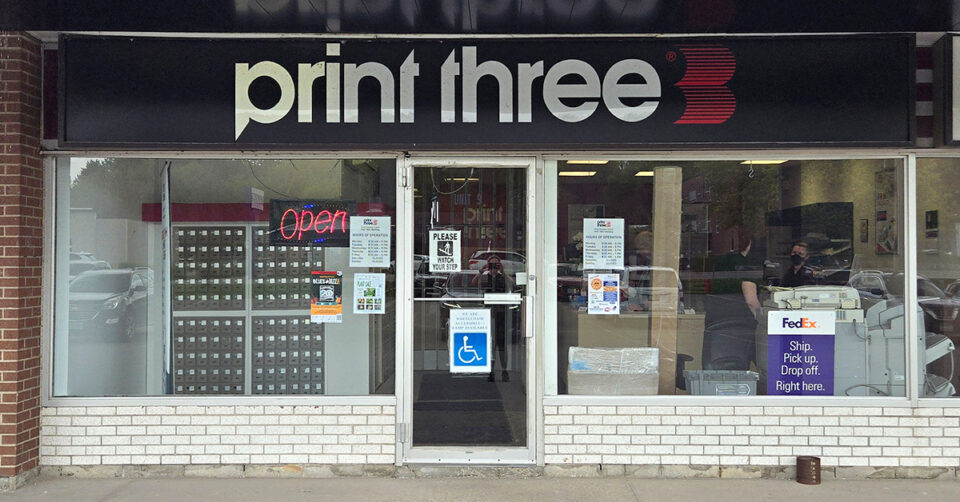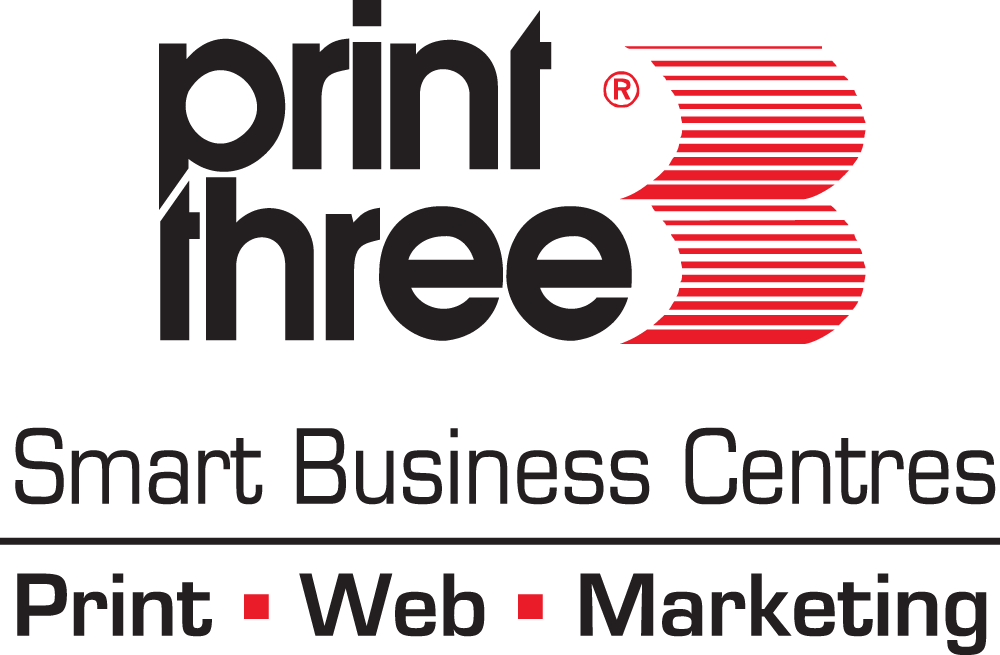There is immense value in purchasing a resale franchise location instead of starting anew—just ask Karin Vierhuis, a Print Three franchisee who found success in this model
By Kym Wolfe
Some people may think that in today’s digital world there’s no need for hard print services. Not true, says Karin Vierhuis, who has owned the Print Three franchise in Orangeville, Ontario, since October 2019.
“I saw potential for growth in the industry,” she says. “Our clients are using a mix of media, not totally digital—print is still a very valuable tool.”
That was really driven home in Vierhuis’ first year, when the pandemic shut down so much of the world. Remember all the signage that sprung up in every public place, ensuring people were masking, distancing, and taking other precautions to stay safe? “We were lucky because we also had a courier depot and rental mailboxes on-site, and those along with printing were all considered essential services,” says Vierhuis.
The mailboxes and courier were a legacy from the store’s previous owner, who operated an independent print shop before Vierhuis purchased it and rebranded it as Print Three. When she approached Print Three about purchasing a franchise, they supported her through the process of buying and converting the Orangeville shop to a Print Three location.
A blueprint for prosperity
Print Three’s current expansion strategy is to convert existing print shops, which offers new franchisees several benefits, says the company’s franchise president Andrew Hrywnak: primarily a lower initial investment in building and equipment, an already-established customer base, lower operating costs due to Print Three’s purchasing power for equipment and supplies, and the ability to offer a full range of services from day one by tapping into Print Three’s extensive network.
“If people are investing their life savings, we can give their new business a good kick-start,” he says. “From day one, the business is profitable or at least break-even.”
Vierhuis purchased her store from an older gentleman who was ready to retire. Print Three helped her find the shop, inventoried and assessed the existing equipment, smoothed the transition for taking over leases, and advised her on the best options for procuring equipment that needed to be updated or replaced.
“The shop had some technology gaps and outdated processes, so we focused heavily on improving that,” she says. “With Print Three, I got preferential payments and pricing. I believe my click fee (per copy cost) is about 25 per cent lower than the previous owner paid as an independent.”
A franchise rep was in-store with Vierhuis for the first two weeks of operation, and she also negotiated to have the previous owner stay on for a two-month transition period. That support augmented the initial in-class and practical training that she received from Print Three. The majority of the three-week training is done at each franchisee’s new location, says Hrywnak, ensuring they and their staff are fully trained on the equipment they will actually be using.
From the beginning, Vierhuis planned to hire a manager to oversee the daily operations, but she also went through all the training to ensure she understood all aspects of the business and would be able to step in as needed.
“I had some experience in an in-house print shop when I worked for a real estate office, so I understood the technical aspects, but it’s not my job to be on-site every day,” she explains. “I was lucky to find a general manager with 20 years of experience to run the store and handle production. I handle the marketing, sales, vendor selection, and more, and although I initially did my own bookkeeping, I found that especially during the start-up year I was so busy I needed to hire a bookkeeper.”
It’s not a large operation, at less than 1,200 square feet, with one part-time staff member in addition to the manager, and Vierhuis recognizes that there is a lot of room to expand capacity.
“Before COVID, we did a lot of printing for events—posters, tickets, programs, etc. That part of the business never bounced back,” she explains. “We also found that after COVID some of the products that we had produced heavily were no longer in demand. We had to adapt our strategy and target new customers. The Print Three team connected me with other stores in comparable markets to see what was working for them and helped me take a look at marketing programs within the franchise that I hadn’t been leveraging.”
Vierhuis believes it’s important for anyone starting a new business to hire the appropriate experts (like a bookkeeper) and to also ensure they understand the demographics and expectations of their customer base. “For example, my first instinct was I have a store so I need to have regular retail hours, but Print Three’s bread and butter is B2B, which means there are not many customers on a Saturday.” Accordingly, she shifted her store hours to be open until 5 p.m. during the week and closed on weekends.
The benefits of the takeover
Looking back on her first year, Vierhuis says, “I can’t stress enough how effective the conversion model is. It eliminates a lot of the stress of an initial start-up. Our contractor had worked on other Print Threes and recommended some small details that have made a big difference—for example, wider doors to accommodate moving equipment in and out, not just initially but in the future. All the renos were done in 48 hours, so we only lost one business day. Print Three set up best practices, and the franchisor and its staff are very supportive and friendly.”
“The other Print Three owners are more than willing to answer questions and help out,” she adds. “The larger network gives you access to equipment you may not have on-site, so I was able to offer the full range of Print Three services from day one.”
“Having a supportive franchisor is priceless,” continues Vierhuis. “The team is constantly sharing new industry information and helping to make sure we have the most up-to-date equipment and product offerings. They have great partnerships with vendors and industry partners to help you grow your business.”
Vierhuis did find herself overwhelmed with the range of available options during her first year, but now she has time to step back and reconsider them. She’s decided to add digital marketing and brand consultation services to her mix this year; Print Three has partnerships with digital providers, and Vierhuis knows there is demand among her small business clients who don’t have the resources to set up their own in-house staff to do that work. It’s one more thing she can offer as she builds her full-service shop.
“The more products and services they are buying from you, the ‘stickier’ the customer,” she says.
Learn more about franchising with Print Three Franchising Corporation


